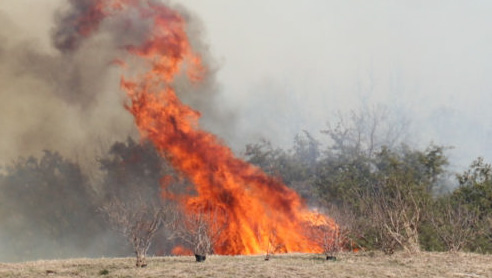
Wildfire activity is expected to increase through the weekend as more areas across the state will be characterized by dry to extremely dry surface fuels.
There is high potential for large, significant wildfires to occur on Saturday in the Western/Eastern Hill Country, Southern Plains, High Plains and South Texas regions. Extremely dry vegetation across these regions will support increased potential for large wildfires when exposed to critical fire weather.
Critical fire weather includes above normal temperatures, increased wind speeds and low relative humidity levels. Wildfires that ignite under these conditions may be resistant to control.
Additionally, timber litter fuels in East and Central Texas will likely become more receptive to burning through Saturday and support increased wildfire activity.
The fire environment on Sunday and Monday will support a moderate to high potential for large wildfires in the High Plains, Southern Plains, Western Hill Country and Rolling Plains where extremely dry vegetation and critical fire weather will be present.
Texas A&M Forest Service continues to monitor the situation closely and has positioned personnel and equipment across the areas of concern for a quick and effective response to any new wildfire ignitions.
Over the past seven days, Texas A&M Forest Service, Texas Intrastate Fire Mutual Aid System (TIFMAS) firefighters and local fire departments responded to 117 wildfires that burned 23,560 acres.
On April 7, Texas A&M Forest Service and TIFMAS firefighters responded to 38 requests for assistance on wildfires that burned 9,258 acres across the state. This total includes 30 new ignitions for East Texas. During peak activity yesterday, East Texas fire resources received, on average, one call every 14 minutes for assistance on a new wildfire.
Today, fire resources will continue suppression activities on several active wildfires including the Britt Fire in Wheeler County (8,152 acres, 75% contained), the Valley Springs Fire in Hays County (50 acres, 60% contained), the Quail Fire in McLennan County (50 acres, 90% contained) and the Marion 1845 Fire in Marion County (5 acres, 50% contained).
Above normal wildfire activity has been the norm since December 2021. The frequency of significant wildfires has increased in parts of West Texas and South Texas since mid-March, as periods of critical to extreme fire weather occurred over regions experiencing severe to exceptional drought.
“The potential for large, significant wildfires across West Texas and South Texas will remain through early May,” said Wes Moorehead, Texas A&M Forest Service Fire Chief. “It is essential that Texans prepare for continued wildfire activity and to help prevent new ignitions.”
Nine out of 10 wildfires in Texas are human caused. Texas A&M Forest Service encourages the public to avoid outdoor activities that cause a spark while warm, dry and windy conditions are present.
“During these critical fire weather conditions, it is extremely important to remain mindful of all outdoor activities,” said Karen Stafford, Texas A&M Forest Service Prevention Program Coordinator. “Any activity that can create a spark, can start a wildfire.”
-
Postpone outdoor burning until conditions improve and always check for burn restrictions.
-
Avoid parking and idling in tall, dry grass. Catalytic converters can get hot enough to ignite the grass under a vehicle.
-
Avoid setting hot chainsaws or other hot, gas-powered equipment in dry grass.
-
When pulling a trailer, attach safety chains securely; loose chains can drag on the pavement and cause sparks, igniting roadside fires.
Stay wildfire aware. If a wildfire is spotted, immediately contact local authorities. A quick response can help save lives and property.
For current conditions and wildfire outlook, read the Texas Fire Potential Outlook https://bit.ly/3kemhbG.
Texas A&M Forest Service does not own any aviation resources but instead uses federal aviation contracts through the U.S. Forest Service and Bureau of Land Management for all firefighting aircraft.